E-Bikray is a government-approved online platform designed to simplify the process of participating in property auctions. It allows individuals and organizations to bid on foreclosed properties, bank assets, and other auctioned items across India in a transparent and secure environment.
With E-Bikray, users can easily register, search for auction properties, add funds to their accounts, and place bids from the comfort of their homes. The platform provides a seamless experience with a user-friendly interface, secure payment gateways, and real-time updates, ensuring that all auction participants can engage effectively in property auctions.
Step 1 - Open the eBikray Website
- Open the eBikray website by searching "eBikray.in."
- Once the site opens, click on the three-line menu in the corner.

Step 2 - Login to Your Account
- Click on "Login" and enter your registered email ID and password.
- Complete the login process by entering the OTP sent to your registered email or phone.
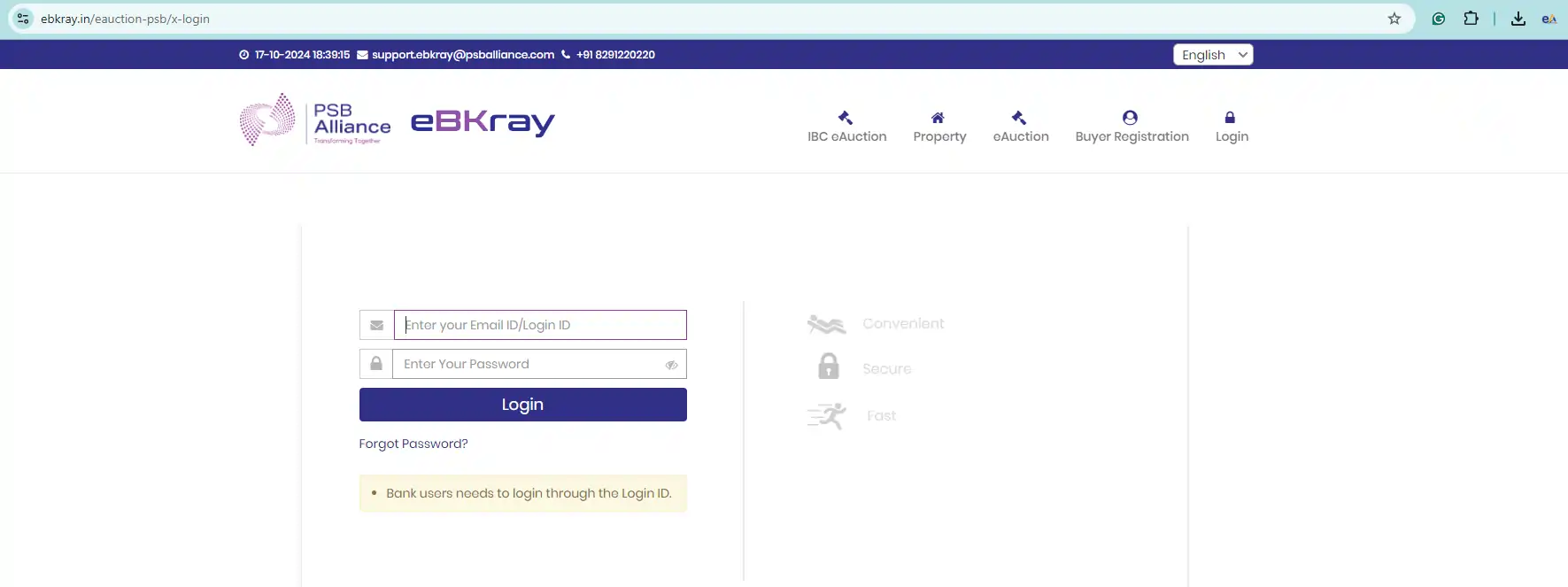
Step 3 - Search for Auction Property
- Click on the "Search Property" option under the "Property" section.
- Enter details like state, city, and bank to find the property you are interested in.
- Alternatively, you can scroll down and click on "View All" to browse upcoming and live auctions.
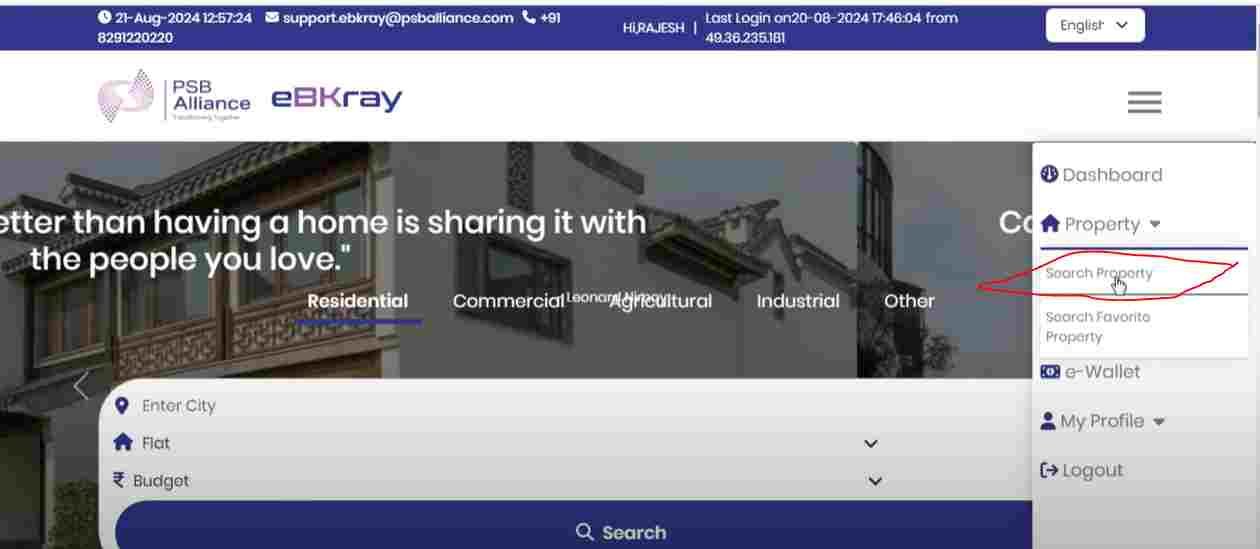
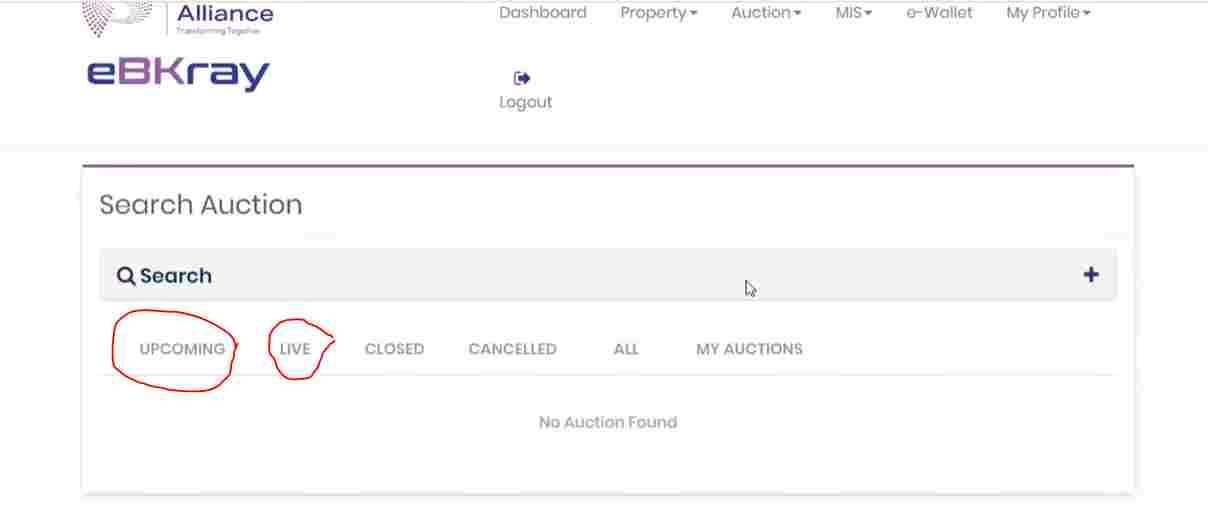
Step 4 - Select the Auction Property
- Select your property from the search results by clicking on the plus icon.
- If you know the auction ID or property ID, you can enter that to search directly.
- For example, I selected a property in Pali, Rajasthan, under Bank of Baroda.
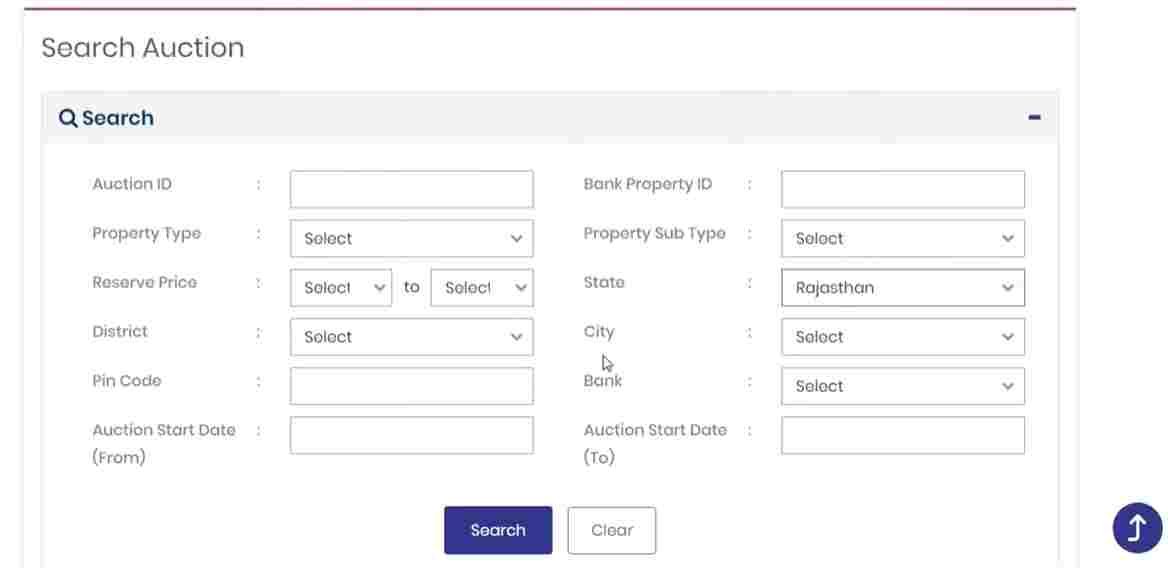
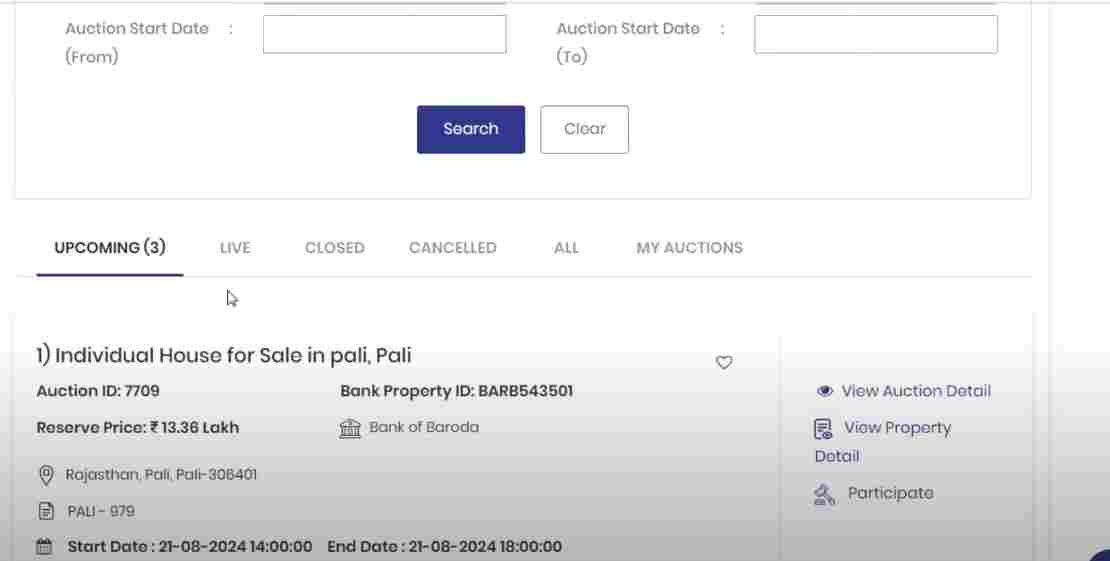
Important eBkray Auction Steps
- KYC Verification: Before you can place a bid, ensure that your KYC documents are verified. Without this, your bid won’t be accepted.
- EMD Payment: Participants must pay the Earnest Money Deposit (EMD). This can be done through the payment gateway available on the platform, or by generating a challan and depositing the amount into a designated wallet.
- Bid Submission: During the auction, the bid price must be higher than the reserve price. You can increase your bid in specific increments during the live auction.
Make sure to complete all steps before the auction starts to avoid any last-minute issues.
Key Features of eBkray’s Auction Process
- Unlimited 10-Minute Extensions: If a bid is placed within the last 10 minutes of the auction closing, the system automatically extends the auction time by another 10 minutes. This ensures fair competition among all bidders.
- “As is Where is” Sales: Properties on eBkray are sold under “as is where is” terms. This means the property is sold in its current condition, and bidders should inspect the property before submitting their bids.
Step 5 - Participate in the Auction
- Click on the "Participate" button for the auction you want to enter.
- You will need to follow four steps to participate:
- Deposit EMD (Earnest Money Deposit).
- Agree to the auction’s terms and conditions.
- If you are bidding as part of a group, add group members.
- Complete the KYC for all members.
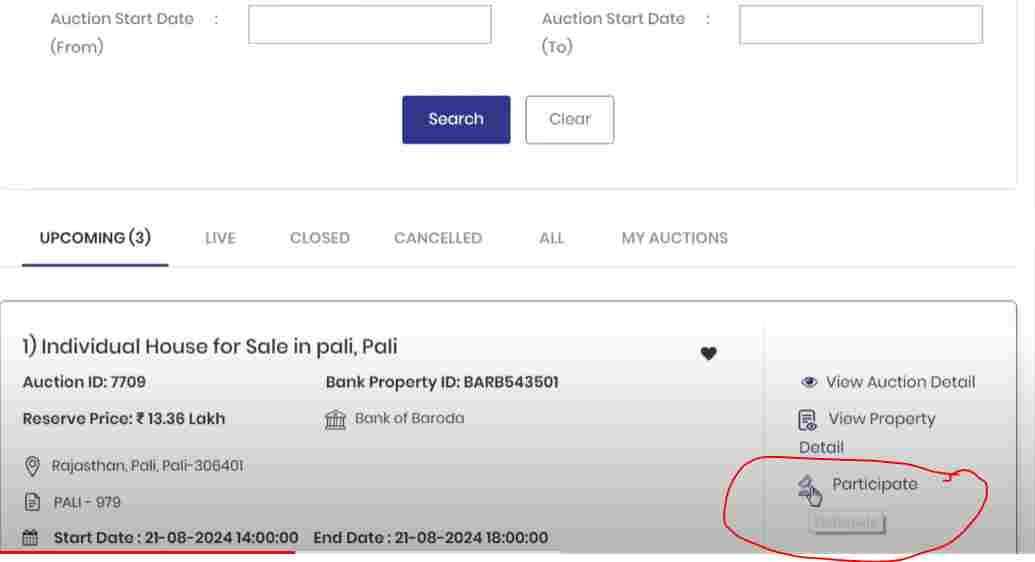

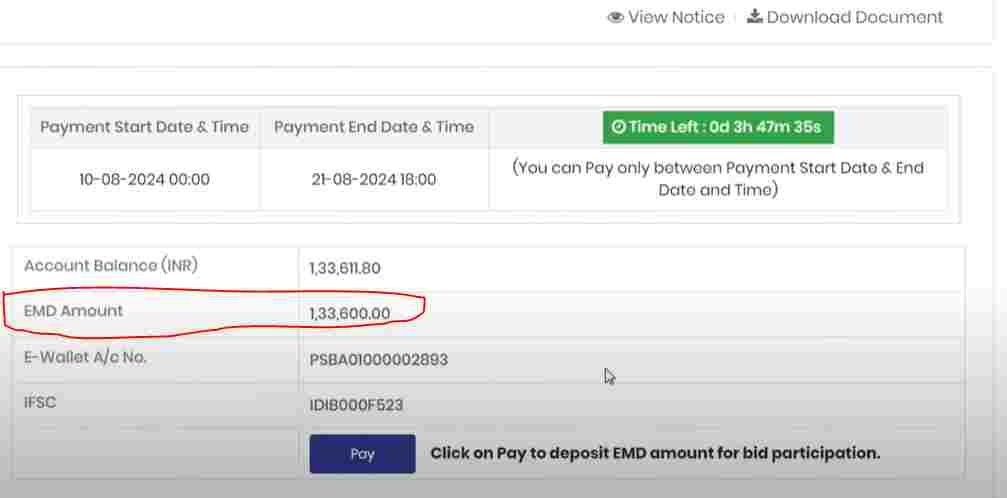
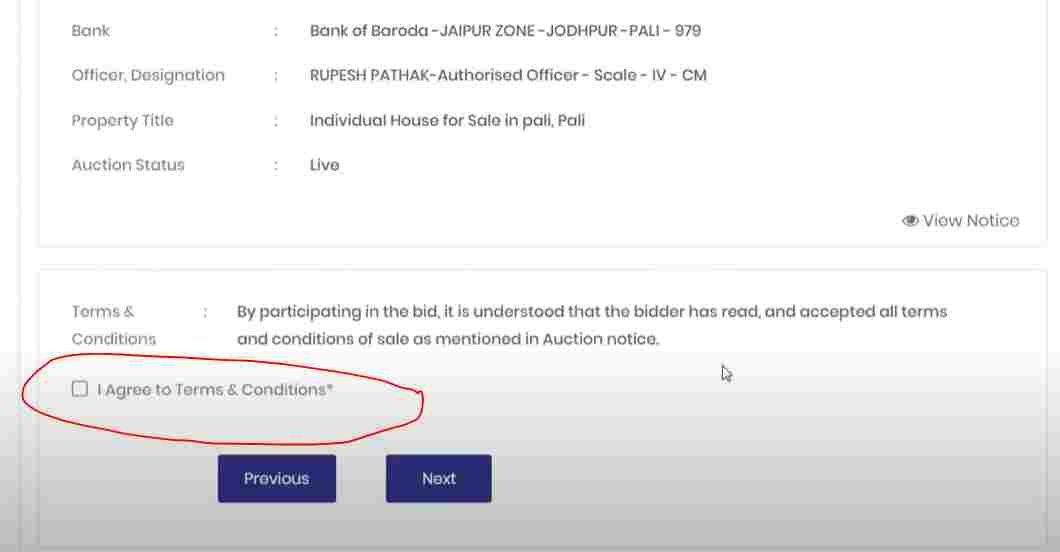
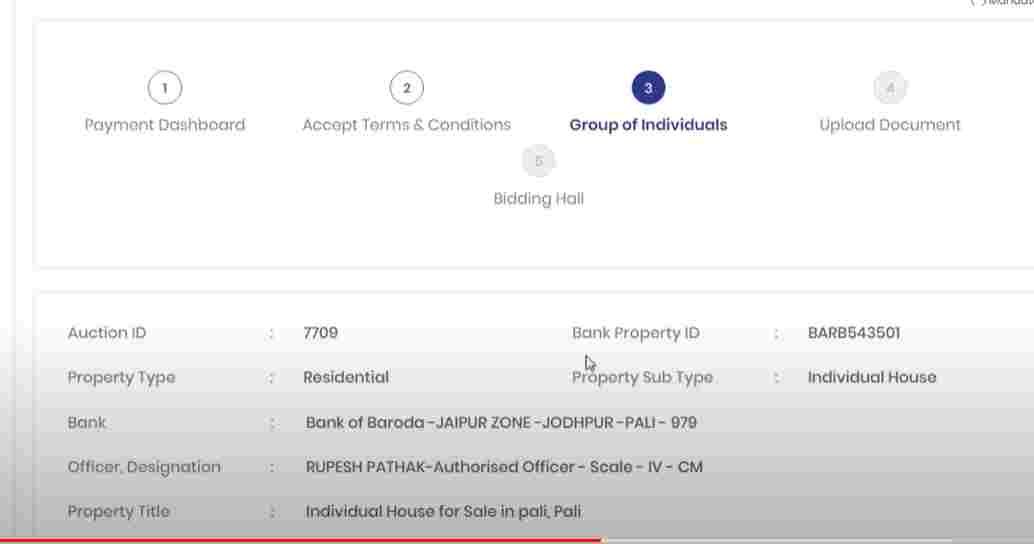
Step 6 - Review Auction Details
- Check the auction details, including the reserve price, increment amount, and auction dates.
- Make sure to deposit the EMD amount before the deadline to participate in the auction.
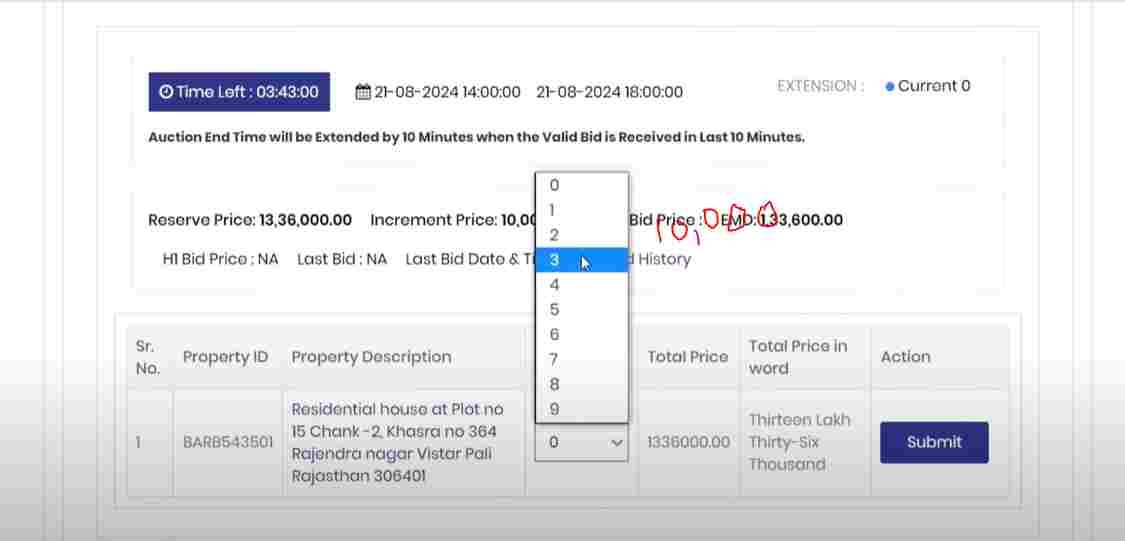
Step 7 - Place Your Bid
- Enter your bid by increasing the amount by the required increment (e.g., ₹10,000).
- Confirm your bid amount and submit it.
- You will see a confirmation that you are the highest bidder if no one has outbid you yet.
Step 8 - Monitor Bidding Status
- As the auction proceeds, you can track your bidding status.
- If you remain the highest bidder until the end, you win the auction.
- The auction time will be displayed, and the process ends once the time runs out.
Step 9 - View Auction Results
- After the auction closes, check the result by going to the "My Auctions" section on the home page.
- Click on "View Auction Details" to confirm if you were the highest bidder.
- You can save this information as a PDF or take a screenshot for future reference.
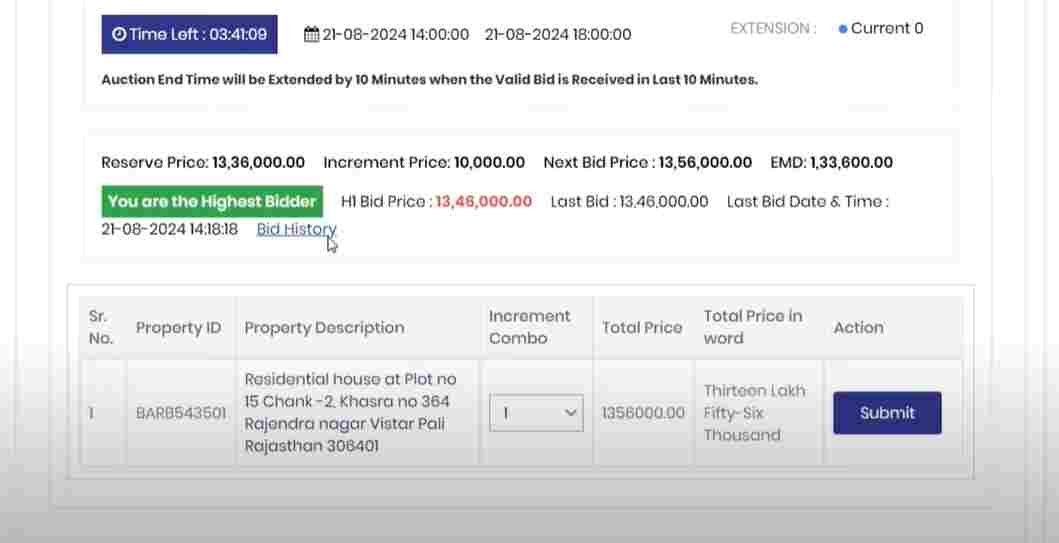
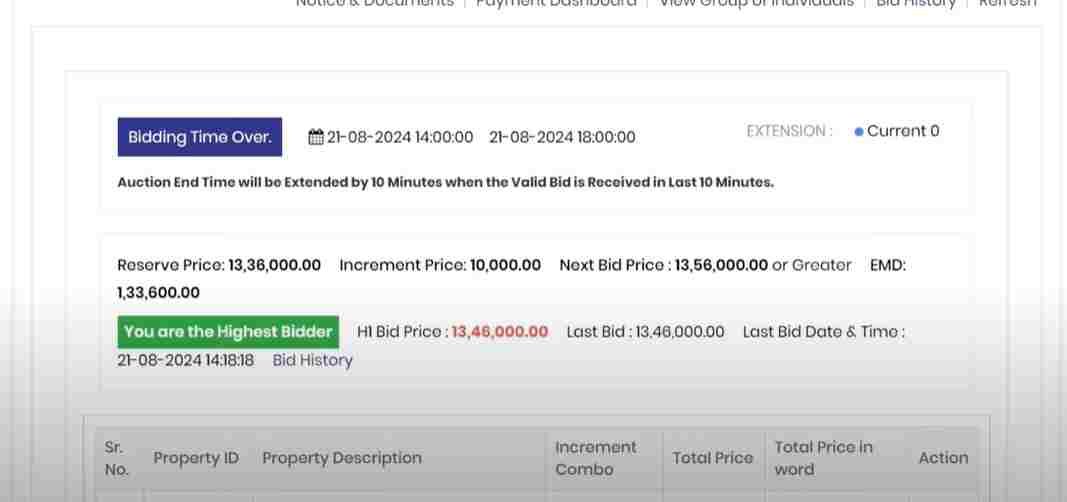
Step 10 - Complete Payment and Property Registration
- Once you win, deposit the remaining amount with the bank within the given time frame (usually 15 days or 24 hours).
- After depositing, collect the bid confirmation and sale certificate.
- You can then register the property at the sub-registrar’s office.
Step 11 - Post-Auction Formalities
- After winning the auction, you’ll typically receive an email or SMS from the auctioning authority confirming your successful bid.
- Along with this, you will be required to complete any pending payments. This amount is usually the difference between the winning bid and the earnest money deposit (EMD).
- Ensure timely payment to avoid the cancellation of your bid or forfeiture of the EMD.
What Happens After Winning a Bid?
- Upon winning, you must deposit 25% of the total bid amount immediately (inclusive of the EMD). The remaining 75% must be paid within 15 days or as per the terms mentioned in the auction notice.
- A sale certificate will be issued after payment confirmation. Note that any taxes (such as GST) and registration charges are the buyer's responsibility.
Refund of EMD for Unsuccessful Bidders
For those who do not win, the EMD refund process can be initiated directly on the eBkray platform. After logging into your account, follow the steps outlined in the eBkray buyer manual to request the refund.
Step 12 - Documentation for Property Transfer
- Once the final payment is made, the next step involves the issuance of a Sale Certificate. The Sale Certificate is a legal document that transfers ownership of the property to the winning bidder.
- You must take the sale certificate to the sub-registrar’s office for property registration. This step is essential for officially transferring the title of the property to your name.
- Documents required for registration usually include:
- The Sale Certificate issued by the auctioning bank.
- Proof of identity and address (Aadhaar, PAN Card, etc.).
- Property-related documents, such as prior agreements and property tax receipts.
- Receipt of final payment to the bank.
Step 13 - Legal Due Diligence (Before Bidding)
- Inspect the Property: Before placing a bid, it’s crucial to personally inspect the property if possible. Banks will often allow prospective bidders to visit the property.
- Check Legal Clearances: Verify that the property has clear ownership records, and there are no ongoing disputes or litigations. Review land title documents and confirm that there are no encumbrances on the property.
- Understand the Auction Terms: Carefully go through the auction’s terms and conditions. These terms will govern the auction process, bid amounts, and the obligations of both the auctioneer and the bidder.
- Check Auction Reserves: The reserve price is the minimum amount the auction starts at, but properties are sometimes sold for much more. Ensure you are comfortable with a possible price escalation.
Step 14 - Important Auction Terminology
- EMD (Earnest Money Deposit): A deposit made to demonstrate your genuine interest in participating in the auction. It is refunded if you do not win the auction, but it’s non-refundable if you win and do not proceed with the full payment.
- Reserve Price: The minimum price set by the auctioning authority, below which the property will not be sold.
- Incremental Bid Amount: This is the set amount by which a bid can be raised during the auction process. For example, if the reserve price is ₹10 lakhs and the increment amount is ₹10,000, each new bid must increase by at least ₹10,000.
Step 15 - Tax and Additional Costs
- Stamp Duty and Registration Fees: Once you win the auction and receive the sale certificate, you must pay the applicable stamp duty and registration fees at the sub-registrar’s office. The percentage of stamp duty varies depending on the state where the property is located.
- Maintenance and Other Charges: Be aware that certain properties, particularly those in residential societies or gated communities, may come with additional charges such as maintenance fees, society charges, or pending utility bills. Ensure that you check for any unpaid dues before committing to the purchase.
Step 16 - Handling Auctions in Groups
- If you’re bidding on behalf of a group or a business entity, ensure all group members are registered under the bidding account.
- Group bids often require additional documentation such as partnership agreements, and all group members must complete KYC (Know Your Customer) verifications.
- Designate a lead member for the bidding process who will be responsible for the communications and transactions on behalf of the group.
Step 17 - After-Sale Support
- Many banks and financial institutions provide after-sale services, including support for loan processing if you require financing for the remaining balance after winning the auction.
- It’s advisable to clarify any potential post-auction services or financing options beforehand if required.
Customer Support:
Phone: +91-XXXXX XXXXX
Email: support@ebikray.com
Website: www.ebikray.com
Office Address:
eBikray Solutions Pvt. Ltd.
123, Auction Avenue,
City Center, Jaipur - 302001, Rajasthan, India.
Support Timings:
Monday to Friday: 9:00 AM - 6:00 PM
Saturday: 10:00 AM - 4:00 PM













